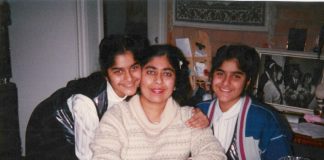Aisha Chaudhry is an author and advocate for the South Asian community and organ donation. She openly discusses issues surrounding religious communities and this topic, with emphasis on the imperative importance of organ donation.
Born in Berkshire, her family experiences and the tragic loss of her mother have made her a leading voice representing this community. She hopes to spread further awareness through her book, ‘Family Matters’.
Aisha’s mother was 49 years old when she passed away, having been diagnosed with kidney failure 11 years prior. Aisha was 15 years when her mother was diagnosed, and 25 when she had to deal with the tragic loss of her mother alongside the support of her father, twin sister, and two brothers.
Aisha describes her family life as being very “fortunate, and a tight unit”. She highlights how sometimes hardships in life can break families apart, but this was not the case in her situation. She relied on her family, and them on her, for the support they all needed.
She spoke highly of her father who spent any time he could with his loving wife, taking her to and from dialysis appointments. She fondly recalls these memories, as she speaks of her close family in the car after treatment appointments, eating samosas together. However, those precious memories were what the family had to hang onto when Aisha tragically lost her mother in 2001.
During the 11 years of her mother’s kidney failure, the family tried to advocate to their community and get people talking about just how important organ donation is. However, with kidney transplants only being successful for around 30 years at this time, getting onto the topic of this conversation within her community was incredibly difficult. Especially as the family was told by doctors that for a successful transplant, the organ most likely had to come from someone who is of the same ethnic background.
Aisha discusses how she wished they had been more vocal to try and engage with her community on this subject, even at such a young age. She discusses how the subject is taboo, as organ donation feeds into religion and faith, as well as going against what some elders may think.
This led to the topic of organ donation often being breezed past, in the hope to not upset Aisha and her siblings who were going through one of the hardest experiences imaginable, losing their mother.
This is what inspired Aisha to write her book ‘Family Matters’. Topics of religion are detailed within. As well as highlighting that any faith has an underlying passion for helping others, and that joining the organ donation list or giving blood can truly save lives.
As for the South Asian community, this is a vitally important message to share, as lives are still being lost due to the lack of conversation and education around this topic.
Aisha highlights how it is the South Asian communities who need to support donations the most. This is due to health issues such as diabetes being rife, thus causing the need for organ donations. Dr Agimol Pradeep highlights in her research that the South Asian community is 5 times more susceptible to diabetes than the white population. This adds weight to Aisha’s extensive research on this matter.
She highlights this “ironic juxtaposition” further in her book. The people who need to help, are some of the most vulnerable people also in need of help.
Aisha highlighted how it is an interpretation of religion that makes topics seem uncomfortable or taboo, but when it comes down to it, good people are the ones who help those in need.
This book aims to reach wider audiences around organ donation within the South Asian community and beyond. She wants “to reach people in hospitals, education, the medical field, religion and communities” to further tell her story, and how this can be prevented in the future.
Aisha was invited to Parliament in 2023, to receive an award during World Organ Donation Week. This week runs annually, and this year falls across 23-29 September. The aim of this week is to educate and shed light on the incredible difference organ donations make.
Although initially impressed and proud to be standing in a room with all South Asian people, celebrating this milestone. Aisha soon found it “heartbreaking”, as she realised people were talking about this issue, but without action being accomplished quickly enough. This “deeply saddened her” as the results of people joining the donor lists, and giving blood were still too low.
With the message of open dialogue perhaps being reached, it was evident that people were still in desperate need of help via blood and organ donations. She hopes her book can be a force of change.
She went on to further explain how she believes her ethnicity has been an obstacle to her voice being heard. As she continuously receives “bog standard replies” when faced with applying for sponsorship, or further funding. She describes this as being truly frustrating to her mother’s memory and the huge challenge ahead.
From Aisha’s story, the issues the South Asian community face when on the topic of blood and organ donation is yet to be fully seen, heard, or understood. This needs to change. Dr Pradeep’s research echoes these statements, as her report from 2015 showed that 54% of the South Asian community felt they had not received enough education on registering as a kidney donor.
Amongst the heartbreaking stories such as Aisha’s mother, there are success in others. The NHS Organ donation site highlights the lifesaving procedures they do, with personal success stories demonstrating the importance of signing up as a donor. However, it is clear education and open discussion are the first steps to saving lives in this field, with action needing to follow; especially within the South Asian Community.




